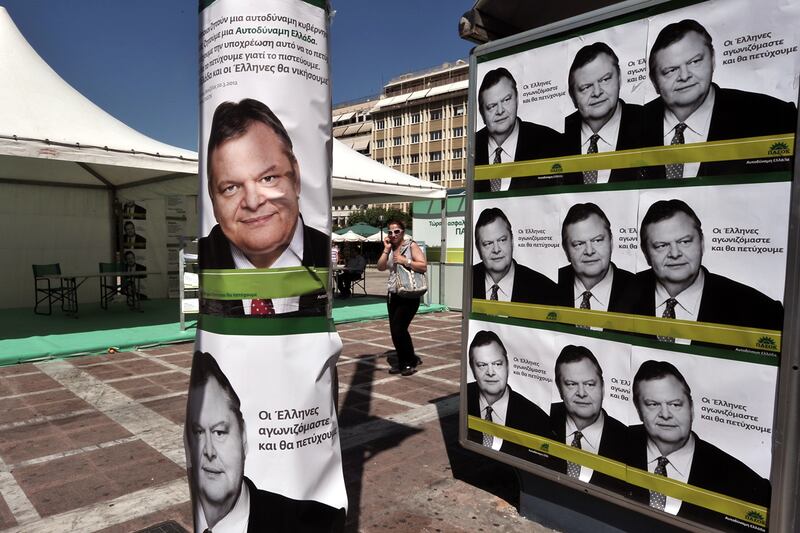You’d be forgiven for thinking Athens was threatening to invade Brussels this weekend rather than merely preparing for a democratic general election.
European officials have reportedly drawn up plans to limit cash withdrawals across Greece, impose border security checks, and introduce capital controls. They reckon that the Greeks will use their votes to demand a return to the drachma and trigger a stampede on the banks.
The European Commission played down the particulars but has said that “contingency discussions” have been held in case Greece either quits or is kicked out of the euro zone.
Outside Athens, the elections this Sunday are being billed as a referendum on euro membership. And so it’s make-or-break time not just for Greece but the whole euro project.
If Greece crashes out of the euro zone, the losses to international creditors and banks would be only part of the story. It would also shatter the view of the euro as a permanent but troubled currency: if one can just quit, regardless of the cost, who’s to stop another?
The timing couldn’t be worse. Spain is in the grip of a debt crisis, too. The country is almost overwhelmed by the rising toxicity of its banks. As the euro zone’s fourth-biggest economy, contributing 12 percent of GDP rather than Greece’s 2 percent, the slide is far more frightening.
Last weekend politicians in Madrid and Brussels moved to try to stabilize Spain before the Greek elections. There was prodding from Barack Obama, too. The president issued a special plea from the White House to demand action to address the banks before the weekend was out.

Brussels doused the flames with the offer of €100 billion to Spain’s troubled banks. But it wasn’t enough. After a brief market rally on Monday, confidence was snuffed out as traders reckoned the support was insubstantial. Within 48 hours of the supposed rescue, Spain’s bond yields—Madrid’s implied borrowing costs on the capital markets—hit a euro-era high of 6.84 percent, just below the 7 percent level that forced Ireland, Portugal, and Greece to seek a full bailout.
The panic was compounded by a growing conviction that European authorities do not have a unified solution or response to the advancing crisis. On Tuesday, leaked details of a four-way teleconference between leaders from the U.S., Italy, France, and Germany two weeks ago show that German Chancellor Angela Merkel was warned explicitly that German insistence on a sovereign rescue for Spain risked great damage to confidence and a dangerous chain reaction. Merkel said she refused to put more taxpayer money at risk. As predicted, the fear has spread. Italy, the euro zone’s third-biggest economy, has been thrust into the crosshairs, too.
On Tuesday, Italy’s bond yields matched Spain’s rise, point for point, and was soon in the danger zone as well.
“The fact that Italy has stronger fundamentals than Spain didn't stop it getting sucked into the euro-zone crisis last summer,” said Nicolas Spiro, a London-based economist.
“Italy is once again experiencing an externally driven deterioration in its perceived creditworthiness. The positives of Italy's credit story, notably its primary fiscal surplus and much lower levels of private debt, count for very little at a time of contagion.”
Merkel now looks horribly alone. She would probably like to devise a solution with the French president. But her old ally Nicolas Sarkozy has been replaced as president by the anti-austerity socialist, François Hollande, who has his own problems: Sunday is also the second round of France’s parliamentary elections.
Instead the big decision looks set to be made by the Greek electorate, who after three years of hard, Berlin-inspired austerity, are not her biggest fans. Even so, contrary to popular belief, most Greeks—around 80 percent—want to keep the euro. For them, the question is not over the ideal of euro-zone unity but the terms.
In the lead-up to the original inconclusive election on May 6, both mainstream parties—Pasok and New Democracy—emphasized the vital importance of sticking to the austerity targets, without which Greece would forfeit their bailout fund and go bust.
But the remorseless logic failed. Syriza, previously a marginal leftist party, stormed the polls and came in second by promising to keep the euro but scrap the bailout agreements and make some new ones. This time around, in a bid to catch up, both the main parties have pledged to renegotiate parts of the austerity agreements, too.
Their new position has set up an ugly clash with Germany, regardless of who wins. This week, Andreas Dombret, an executive board member of the Bundesbank, made Germany’s view extremely clear, saying that Greece needs to stick to its program, “no ifs, no buts.”
The collision could lead Greece to exit the euro zone; if Greece refuses to adhere to the bailout conditions and Germany refuses to release the funds, Athens would go bust very quickly. Analysts reckon the country needs €12 billion just to pay bills including hospital wages and civil servants, let alone the €128 billion economists think is needed to keep the banks afloat.
No country has ever left the euro—there’s not even a mechanism to allow it. But a new drachma is likely to lose at least half of its value compared with the euro. The country’s economic output would plunge. Unemployment—already running at more than 20 percent—would rise, and the cost of living would soar.
Last month, Greece’s ex-premier, Lucas Papademos, reckoned inflation could rise to as much as 50 percent. But it’s not all one-sided. The economist Nouriel Roubini told the German newspaper Bild that Germany needs the euro to survive. He said without the euro, Germany would be an “economic and political dwarf” compared with America and China.
“As an export nation, Germany needs the euro and European countries as trading partners,” Roubini said. “Therefore, swim together or sink together.”
To swim, Germany needs to give its fellow members a life raft and compromise on the bailout agreements. If not, the euro zone could plunge even faster into the depths.






